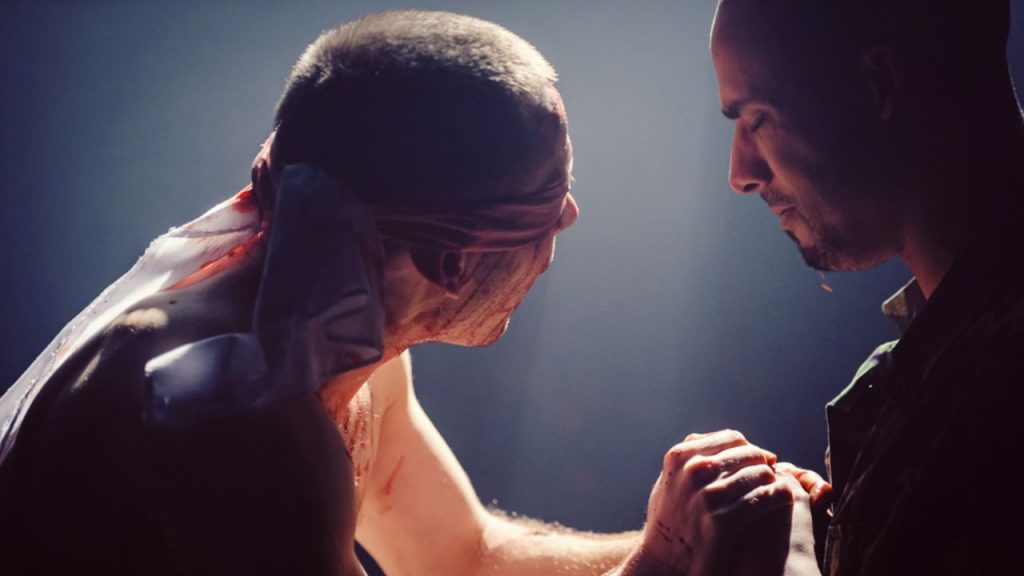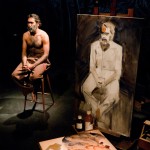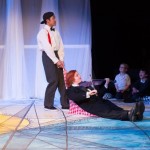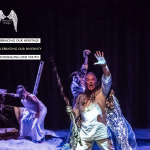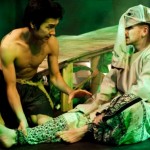Genre: Drama
Venue: Blue Elephant Theatre 59a Bethwin Rd London SE5 0XT
Low Down
The choice to stage Oedipus seems obvious… it’s a great play, though, arguably, since Freud coined the term ‘Oedipus Complex’, Sophocles’ central character might be better known as someone with a psychological malaise rather than as a tragic hero.
There is not doubt, however, when viewing director Ricky Duke’s carefully choreographed and nuanced realisation of Oedipus, that his vision is to enliven a sense of the heroic. He does this by setting Oedipus on his calamitous path in a political maelstrom. Thebes is a place engulfed in a perpetual atmosphere of smoke and fog which seriously limits the individual’s ability to see anything: Theban politics reaching amoeba-like, ever growing and engulfing its citizens and soldiers in wars and plagues.
Review
The strength of Lazarus Theatre Company’s cast and production crew is exemplary: its latest production of Oedipus: After Sophocles runs as tightly as a spring-loaded watch (for those of us who remember the beauty of such a mechanism). The lurking knowledge that Oedipus must come to see that he killed his father and married his mother moves inevitably through each encounter beginning with the arrival of the Priest (Andrew Glen) amid Theban post-battle celebrations. Robin Holden portrays Oedipus with heightened euphoria in the celebration. Like a man giddy with a sense of blood lust, Holden seems to respond to every cry of adulation with an ever-increasing certainty that he deserves such praise.
The image of Jocasta (Samantha Andersen) amongst the soldiers and citizens, dressed in a stunning blue evening gown is memorably out of place: I cannot take my eyes of the effect of the clever use of costume to begin the portrayal Jocasta’s physical allure and beauty in contrast to Oedipus’ violent strength. Samantha Andersen gives the portrayal an edgy quality: Jocasta seems simultaneously anxious and regally poised: a character at war with herself.
As the audience comes to learn about the series of interlinked actions that fatefully bring Oedipus to Thebes, the all-female chorus (Maria Alexe, Sarah Barker, Eleanor Dillon-Reams, Lucy Hagan-Walker, Hanneke Talbot), depicted sometimes as nurses and other times as house servants, seem to deliver, like wretched midwives, the birth of not just one but a series of disasters. They set the tone for malaise that IS Thebes in which the royal family and the soldiers exist.
The war within the royal family is made clear through Alec Parkinson portrayal of Creon as an attractive political rival to Oedipus. He seems to embody all the traits of the loyal warrior who can be counted on to do ‘the dirty work’. With genuineness as his best defence, Creon nonetheless mortally damages Oedipus by exposing his propensity to violently lash out at will.
In the eerie quietness that follows the horror of the plague and the internal disintegration of the royal house, we come to experience the report by a young soldier of Jocasta’s suicide and Oedipus self-blinding. The image of Jocasta’s diamonds cutting at her husband/son’s eyes is made unforgettable by Nasa Ohalet’s stunning delivery of the monologue in which the blinding of Oedipus is placed amongst a scene of utter devastation. By the final chorus, the play’s themes, of the political and personal uses of memories and knowledge, take the audiences to the drama’s cathartic conclusion.
Is it possible to say where such a tragic journey began? Did it start with Oedipus at the crossroad and his murderous slaughter of Laius and his band of travellers? How was he to know that Laius was his father and a man driven by a prophesy, ironically, about his own death? Or is the origins of the tragedy even more sinister, born of Jocasta’s and Laius’s fear that their new-born son will grow up and ruin them and, of course, their hold on power? Is the tragedy the result of destiny or a self-fulfilling prophecy?
Powerful stuff to take in!!
I left the theatre with only one qualm. I couldn’t understand how in the midst of such a worthy production of Oedipus, in the final analysis I felt more for its theatrical brilliance than for the raw suffering of its tragic hero. Where had I feltany sense of bitter suffering in the precision of the production’s staging of devastation? How was it possible that the clever choreography of the all-female chorus did not seem to be about the suffering and pain of people faced faced with endless wars and ravaging plagues? Come to think of it, how did suffering and pain fit at all into the director’s contemporary vision of Sophocles’ original text? Perhaps, rightfully, such extreme pain and suffering should be left in the distant past.
Reviewed by Josey De Rossi Friday, 1st March 2013
Website :
http://blueelephanttheatre.co.uk
